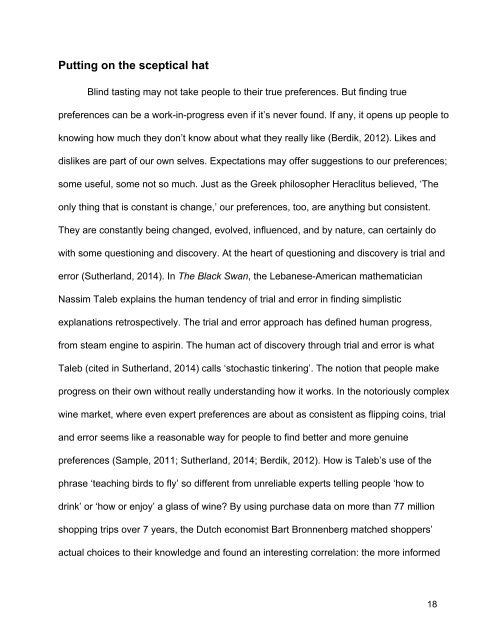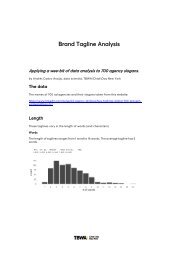The wine delusion
Create successful ePaper yourself
Turn your PDF publications into a flip-book with our unique Google optimized e-Paper software.
Putting on the sceptical hat<br />
Blind tasting may not take people to their true preferences. But finding true<br />
preferences can be a workinprogress even if it’s never found. If any, it opens up people to<br />
knowing how much they don’t know about what they really like (Berdik, 2012). Likes and<br />
dislikes are part of our own selves. Expectations may offer suggestions to our preferences;<br />
some useful, some not so much. Just as the Greek philosopher Heraclitus believed, ‘<strong>The</strong><br />
only thing that is constant is change,’ our preferences, too, are anything but consistent.<br />
<strong>The</strong>y are constantly being changed, evolved, influenced, and by nature, can certainly do<br />
with some questioning and discovery. At the heart of questioning and discovery is trial and<br />
error (Sutherland, 2014). In <strong>The</strong> Black Swan, the LebaneseAmerican mathematician<br />
Nassim Taleb explains the human tendency of trial and error in finding simplistic<br />
explanations retrospectively. <strong>The</strong> trial and error approach has defined human progress,<br />
from steam engine to aspirin. <strong>The</strong> human act of discovery through trial and error is what<br />
Taleb (cited in Sutherland, 2014) calls ‘stochastic tinkering’. <strong>The</strong> notion that people make<br />
progress on their own without really understanding how it works. In the notoriously complex<br />
<strong>wine</strong> market, where even expert preferences are about as consistent as flipping coins, trial<br />
and error seems like a reasonable way for people to find better and more genuine<br />
preferences (Sample, 2011; Sutherland, 2014; Berdik, 2012). How is Taleb’s use of the<br />
phrase ‘teaching birds to fly’ so different from unreliable experts telling people ‘how to<br />
drink’ or ‘how or enjoy’ a glass of <strong>wine</strong>? By using purchase data on more than 77 million<br />
shopping trips over 7 years, the Dutch economist Bart Bronnenberg matched shoppers’<br />
actual choices to their knowledge and found an interesting correlation: the more informed<br />
18




